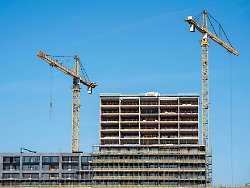Shortage due to Ukraine war
Housing construction could collapse massively
04/18/2022 10:51 am
The war in Ukraine and the corona pandemic pose an enormous problem for the construction industry: although the order books are full, there is a shortage of raw materials. In addition to delays on many construction sites, there is also a much more serious consequence: a stall in the construction industry.
According to industry associations, residential construction in Germany is on the verge of a slump in 2023. The main reasons are a lack of materials and a rapid increase in costs caused by the corona pandemic and the Ukraine war. This makes the costs of new construction projects unpredictable for both the contracting housing company and many executing construction companies and craftsmen, as is unanimously said in the housing and construction industry.
“There will be slumps, and very significant ones at that,” says Hans Maier, director of the Association of the Bavarian Housing Industry (vdw). This agrees with the assessment of the North German sister association VNW: “86 percent of the housing cooperatives and socially oriented housing companies in North Germany currently assess the prospects for new construction as bad or very bad,” says a VNW spokesman in Hamburg. “That’s why 60 percent want to postpone the start of new construction projects or are still unsure.” Both associations mainly represent socially oriented landlords such as cooperatives and municipal housing companies.
Despite cost increases, housing companies are still busy building up and down the country. This also applies to Germany’s largest housing company Vonovia in Bochum and its in-house developer Buwog Development: “But since Buwog usually agrees fixed prices with its subcontractors, such price fluctuations usually have no short-term effects on our new construction business or the prices of the condominiums currently on offer,” says Buwog Managing Director Eve White.
“A situation like we’ve never had before”
In the medium and long term, however, the prospects are unsatisfactory. In a recently published survey by the main association of the German construction industry, 90 percent of companies complained about price increases and 80 percent about delivery bottlenecks. According to this, building material suppliers for many materials currently only quote daily prices or no prices at all. “It’s a situation we’ve never had before,” reports a spokesman for the Bavarian building guilds in Munich. “We have a huge wave of orders, and at the same time there is a lack of raw materials. We have massive price increases every eight weeks.”
According to the construction and housing industry, steel and steel alloys, the aluminum and wood used in many building materials are partly not available. Insulating materials are scarce, as is bitumen, which is important for road construction, and there are bottlenecks and massive price increases for tiles and ceramics.
Clients and construction companies usually agree on fixed prices in their contracts before construction begins. If material costs rise as fast as they are now, construction companies run the risk of ending up making losses despite working at full capacity. In order to prevent red numbers, many companies are no longer applying for new orders: “As a result, more than 30 percent of construction companies are no longer submitting any new offers,” according to the construction industry association. “I fear a significant decline in new residential construction in Mecklenburg-Western Pomerania, Schleswig-Holstein and Hamburg,” says VNW director Andreas Breitner, referring to his North German training. “Due to the long lead times, construction will be completed this year and next, and it will be over by 2024/25 at the latest.”
Roads and tunnels are also affected
And in the south: “We had record completion figures in 2021, we will have good completion figures in 2022, and we will experience a slump in 2023,” predicts Breitner’s Bavarian counterpart Maier.
The problem affects not only building construction, but also civil engineering – ie new roads, tunnels and railways. The federal and state governments are trying to accommodate construction companies with the help of so-called price escalation clauses. This allows construction companies to subsequently increase prices even after the contract has been signed. This means that cost increases are passed on to the builders. One example is the Autobahn GmbH des Bundes. “Autobahn GmbH is currently assuming that the construction projects planned for 2022 can be implemented,” says a spokesman. “Price escalation clauses are already being used in the new tenders if this is permitted under budgetary law.”
There is currently no improvement in sight: “There is a risk of a shortage of building materials wherever the countries of Russia, Ukraine and Belarus are involved in the process chain,” says a spokeswoman for the Munich-based conglomerate and building materials dealer Baywa. Apart from the Ukraine war, there is additional bad news for the German construction industry from East Asia. According to economists, the draconian corona policy in China and the lockdown in Shanghai could further disrupt the international supply chains. Greater Shanghai is the heart of the Chinese economy, and the port is the largest container port in the world.
